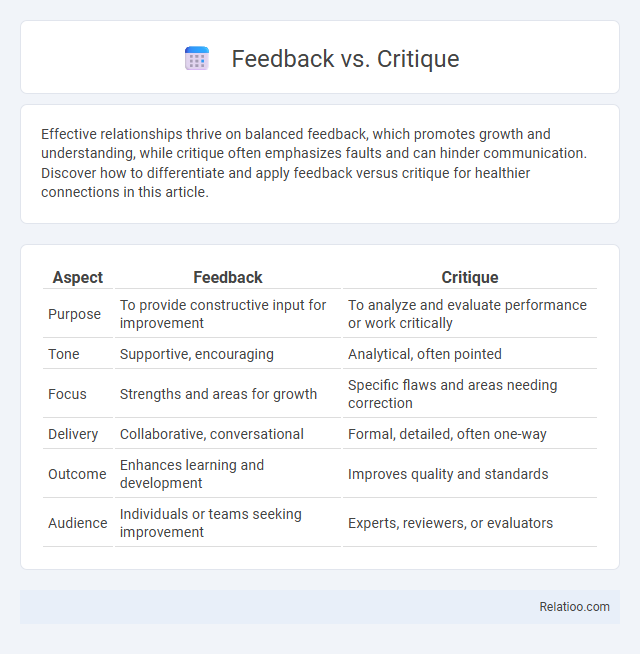Effective relationships thrive on balanced feedback, which promotes growth and understanding, while critique often emphasizes faults and can hinder communication. Discover how to differentiate and apply feedback versus critique for healthier connections in this article.
Table of Comparison
| Aspect | Feedback | Critique |
|---|---|---|
| Purpose | To provide constructive input for improvement | To analyze and evaluate performance or work critically |
| Tone | Supportive, encouraging | Analytical, often pointed |
| Focus | Strengths and areas for growth | Specific flaws and areas needing correction |
| Delivery | Collaborative, conversational | Formal, detailed, often one-way |
| Outcome | Enhances learning and development | Improves quality and standards |
| Audience | Individuals or teams seeking improvement | Experts, reviewers, or evaluators |
Understanding Feedback and Critique
Understanding feedback involves recognizing it as constructive information aimed at improving performance or behavior, often specific and actionable. Critique differs by offering a detailed analysis or evaluation that highlights strengths and weaknesses, emphasizing interpretation and perspective. Both feedback and critique are essential for growth, with feedback fostering development and critique encouraging critical thinking.
Key Differences Between Feedback and Critique
Feedback involves providing constructive information aimed at improvement, often highlighting strengths and areas for growth. Critique typically refers to a detailed analysis or evaluation, emphasizing both positive aspects and shortcomings in a structured manner. The key difference lies in feedback being more general and supportive, while critique is more formal, in-depth, and focused on critical assessment.
Purposes: Why We Use Feedback and Critique
Feedback serves to provide constructive information that helps you improve performance or behavior by highlighting strengths and areas for growth. Critique focuses on evaluating work or ideas systematically to deepen understanding and enhance quality, often involving detailed analysis. Both feedback and critique aim to foster development, but feedback is more supportive and ongoing, while critique is more formal and evaluative in purpose.
The Language of Feedback vs Critique
Feedback uses constructive and supportive language aimed at growth and improvement, often emphasizing specific observations and actionable suggestions. Critique employs analytical and evaluative language, focusing on strengths and weaknesses with a balance of objective assessment and subjective interpretation. The language of critique tends to be more formal and detailed, whereas feedback is conversational and encourages dialogue for mutual understanding.
Emotional Impact on Recipients
Feedback tends to be constructive and supportive, fostering positive emotional responses by focusing on growth and improvement. Critique, while also analytical, can evoke mixed emotions depending on its tone and delivery, potentially causing defensiveness or motivation. Harsh critique often triggers negative emotional reactions such as anxiety or discouragement, underscoring the importance of mindful communication to minimize adverse effects.
When to Offer Feedback or Critique
Feedback is best offered during ongoing projects to guide improvement and reinforce positive behaviors, fostering growth without halting progress. Critique, often more detailed and evaluative, suits post-completion reviews where comprehensive analysis aids future performance and strategic adjustments. Distinguishing when to provide feedback involves assessing immediacy and developmental intent, while critique aligns with in-depth assessments requiring reflection and refinement.
Effective Strategies for Giving Each
Effective feedback emphasizes specific, actionable observations that foster growth, avoiding general judgments to keep the focus on improvement. Constructive critique balances strengths and weaknesses, providing clear examples and suggestions to guide your development while maintaining motivation. Detailed analysis in critical review involves in-depth evaluation backed by evidence, helping you refine complex skills through precise, objective insights.
Common Misconceptions
Feedback is often mistaken for critique, but it is a broader concept encompassing positive and negative observations aimed at growth. Critique specifically refers to detailed analysis and evaluation, commonly associated with artistic or academic work, and is sometimes unfairly viewed as negative judgment. A common misconception is confusing critique with criticism, where criticism tends to imply fault-finding, whereas critique aims for constructive improvement.
Benefits for Personal and Professional Growth
Feedback provides specific, actionable insights that foster continuous personal and professional development by highlighting strengths and identifying areas for improvement. Critique offers a structured evaluation, promoting critical thinking and refinement of skills through detailed analysis and constructive suggestions. Both practices enhance self-awareness, enabling individuals to learn from experiences, adapt strategies, and achieve higher performance levels in various contexts.
Choosing the Right Approach
Choosing the right approach between feedback, critique, and evaluation depends on your goals and the context of the situation. Feedback offers constructive insights aimed at improvement, while critique provides a detailed analysis often highlighting strengths and weaknesses. Your best results come from understanding when to offer supportive feedback or a comprehensive critique to foster growth and effectiveness.

Infographic: Feedback vs Critique
 relatioo.com
relatioo.com